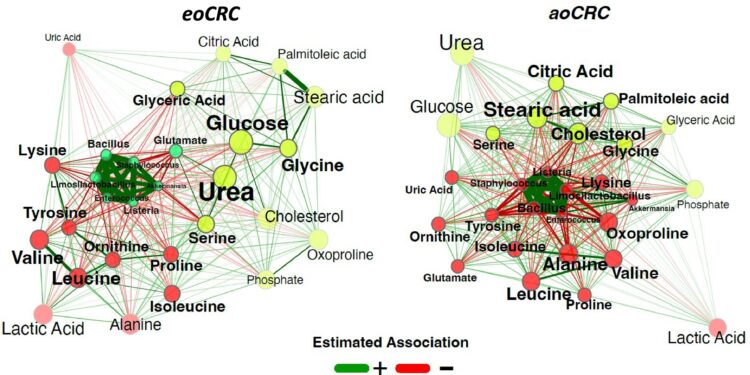Network analysis of metabolism and microbiome correlations between epidemic colorectal cancer and western colorectal cancer. Credit: npj Precision Oncology (2024). DOI: 10.1038/s41698-024-00647-1
A new study from the Cleveland Clinic has identified food-derived molecules called metabolites as major risk factors for early-onset colorectal cancer, particularly those associated with red and processed meat. npj Precision Oncology A report, which analyzed metabolite and microbiome datasets, highlighted that one of the best ways for a younger adult (<60 years) to prevent colorectal cancer is to discuss their diet with their doctor.
Increasing surveillance and screening for colorectal cancer is an extremely useful tool. Despite the success of these methods, these data indicate that physicians may need to take a different approach with their younger patients, says lead author and gastrointestinal oncologist Suneel Kamath, MD.
“Ultimately, it’s not practical to extend our models of care for people over 60 to younger adults, simply because we can’t offer everyone in the system an annual colonoscopy,” he says. “It’s much more feasible to offer everyone in the system a simple test to measure a biomarker that determines their risk of colorectal cancer. Then we can offer those at highest risk appropriate screening.”
Dr. Thejus Jayakrishnan, former clinical investigator, and Dr. Naseer Sangwan, director of the Microbial Sequencing & Analytics Resource Core, co-led the work. Researchers from the Center for Young-Onset Colorectal Cancer at Cleveland Clinic provided large-scale analyses of data from patients who received care for early- and mid-onset colorectal cancer at Cleveland Clinic.
A previous study by this team identified differences in metabolites (diet-derived molecules) in young-onset and mid-onset colorectal cancer, while another identified differences in the gut microbiome between younger and older adults with colorectal cancer.
These studies have opened up a lot of new avenues for studying early-onset colorectal cancer. However, when more factors are involved in cancer risk, it becomes more complicated to understand what is happening and plan future research, Dr. Sangwan says. The interactions between these factors, such as when our gut bacteria consume our metabolites and produce their own, make the picture even more complex.
Dr. Sangwan and his team then developed an artificial intelligence (AI) algorithm to combine and analyze the datasets from existing studies and clarify which factors were most relevant for future studies. Surprisingly, Dr. Sangwan’s analysis revealed that differences in diet (identified by metabolite analysis) accounted for a significant proportion of the differences observed between patients with early-stage disease and patients with more advanced disease.
“Researchers, including us, have started to look at the gut microbiota as a major risk factor for colon cancer. But our data clearly show that the major factor is diet,” says Dr. Sangwan. “We already know the key metabolites associated with risk of early onset of the disease, so now we can move our research in the right direction.”
The team was excited to find that diet played such a significant role in cancer risk, because it is much easier to identify patients at risk by counting metabolites in their blood than by sequencing bacterial DNA in their stool for different microbes.
“It can be very complicated and difficult to change your microbiome,” says Dr. Kamath. “While it’s not always easy, it’s much easier to change your diet to prevent colon cancer.”
Acting on dietary factors to prevent colon cancer
Younger colon cancer patients had higher levels of metabolites associated with the production and metabolism of an amino acid called arginine, and the urea cycle, compared with their older peers. These differences may be related to long-term consumption of red meat and processed meat. The team is now analyzing national data sets to validate the Cleveland Clinic-specific findings in patients across the country.
Having shown that arginine and urea cycle metabolites (and, by proxy, overconsumption of red and processed meat) are elevated in young adults with colon cancer nationwide, they plan to test whether certain diets or commercially available drugs that regulate arginine production and the urea cycle can help prevent or even treat early-onset colorectal cancer.
Dr. Kamath says that while more research is needed to understand exactly how dietary factors cause colon cancer, his current findings have already changed the way he provides patient care.
“Even though I knew before this study that diet was a major factor in colon cancer risk, I didn’t always talk to my patients about it at their first visit. There’s so much to do, it can be overwhelming,” says Dr. Kamath. “Now, I always make sure to talk to my patients, as well as any healthy friends or family members they come with, to try to give them the tools they need to make informed lifestyle choices.”
More information:
Thejus T. Jayakrishnan et al, Multi-omics machine learning to study host-microbiome interactions in early-onset colorectal cancer, npj Precision Oncology (2024). DOI: 10.1038/s41698-024-00647-1
Provided by Cleveland Clinic
Quote:Study finds diet is major risk factor for colon cancer in young adults (2024, August 14) retrieved August 14, 2024 from
This document is subject to copyright. Apart from any fair dealing for the purpose of private study or research, no part may be reproduced without written permission. The content is provided for informational purposes only.



